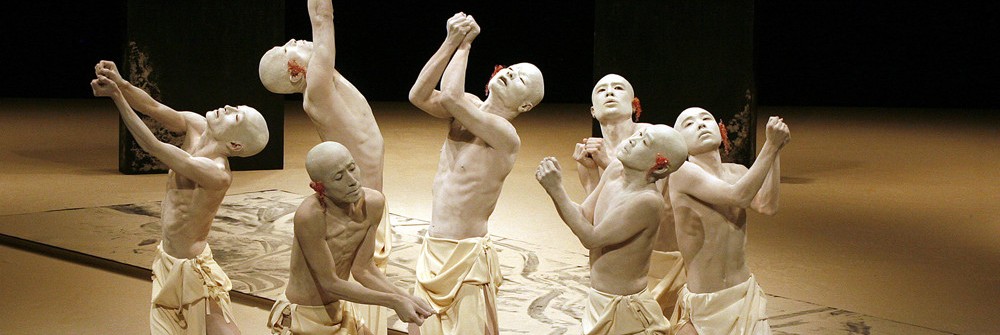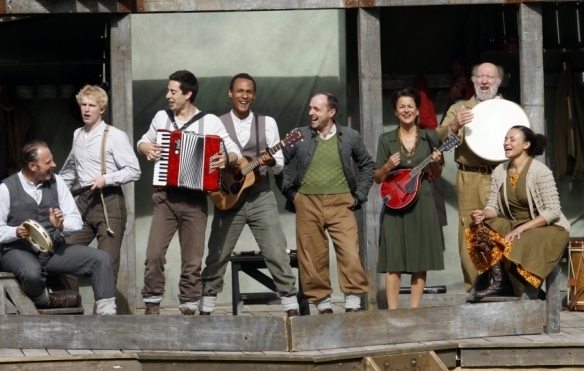 Perhaps more that any other art form, theatre is a political beast. It has to be, it is about the human condition. Whether it is the content that is political, or the mere act of staging something in a certain place, politics is never very far away. In democracies that have a left leaning government, theatre usually thrives and is supported by the state as a forum for discussion and debate. In those that lean to the right, theatre making shrinks as state funding is usually withdrawn or cut, being viewed as subversive and unnecessary. What the right have yet to work out is that their attempts at suppression only forces theatre makers to shout louder. More extreme governments hijack theatre as propaganda and/or ban work that doesn’t support ‘the cause’. Now of course these are generalisations, but without doubt there is some truth in them.
Perhaps more that any other art form, theatre is a political beast. It has to be, it is about the human condition. Whether it is the content that is political, or the mere act of staging something in a certain place, politics is never very far away. In democracies that have a left leaning government, theatre usually thrives and is supported by the state as a forum for discussion and debate. In those that lean to the right, theatre making shrinks as state funding is usually withdrawn or cut, being viewed as subversive and unnecessary. What the right have yet to work out is that their attempts at suppression only forces theatre makers to shout louder. More extreme governments hijack theatre as propaganda and/or ban work that doesn’t support ‘the cause’. Now of course these are generalisations, but without doubt there is some truth in them.
This week there have a few rumblings of discontent about the forth-coming world tour of Hamlet by the Globe Theatre, which I wrote about in July last year, Going Global. The theatre announced that in their attempt to visit every country in the world, North Korea was on the itinerary for September this year. This immediately drew criticism from Amnesty and Human Rights Watch. Niall Couper from Amnesty said:
North Korea is a country where the horrors inflicted on people who fall out of favour are worse than any fiction….No tragic play can come close to the misery that 100,000 people trapped in the country’s prison camps endure, where torture, rape, starvation and execution are everyday occurrences.
 To be fair, Amnesty didn’t suggest that the theatre should boycott North Korea, but urged the company to read up on its human rights abuses first. Meanwhile Phil Robertson from Human Rights Watch (Asia) commented that exclusion would be the order of the day if the performance went ahead:
To be fair, Amnesty didn’t suggest that the theatre should boycott North Korea, but urged the company to read up on its human rights abuses first. Meanwhile Phil Robertson from Human Rights Watch (Asia) commented that exclusion would be the order of the day if the performance went ahead:
It’s going to be an extremely limited, elite audience that would see a production in any case. It would have to be in Pyongyang, which is a showcase city whose residents are selected to live there because they have shown their loyalty, so there’s a strict pre-selection process involved right from the off.
Many commentators have of course noted the sinister connection between Prince Hamlet’s murderous revenge on his uncle Claudius in the Shakespearean tragedy and recent events in North Korea. As a report from CNN said
The parallels of staging a drama about an epic family power struggle in Pyongyang, where the country’s young leader Kim Jong Un had his uncle, Jang Song Thaek executed has raised a few eyebrows…..Jang was considered instrumental in Kim’s rise to power, but Kim turned his back on his uncle in spectacular fashion late last year as Jang was branded “a traitor for all ages” and executed on charges that he had attempted to overthrow the government.
Phil Robertson drily noted that
When the North Korean leadership gets around to reading the plot of Hamlet, one imagines they might well insist on something else from the canon
The story has made international news, from Bangkok and South Korea, to Germany and the US. I suppose this says a lot about how well regarded the Globe is around the world. However, it is politicking that is driving the story. Not surprisingly, the Globe hit back issuing a statement that, amongst other things, said:
We have decided that every country means every country, since we believe that every country is better off for the presence of Hamlet. Shakespeare can entertain and speak to anyone, no matter where in the world they are. We have always believed that cultural communication, and different peoples talking to each other through art, is a force for good in the world. In every country, we are going for one single and simple purpose: to play Hamlet there.
We are very proud of our record of working with a selection of NGOs over the years – Amnesty themselves, PEN, Reprieve and Human Rights Watch. We have raised money for their operations, provided space for them, and felt their influence in many of our productions and the new plays we have performed. In that light, we were disappointed that Amnesty put out a quote about our touring without realizing that it was a world tour, but under the impression that it was going solely to one country.
I take their point, but I do wonder whether this is a wise move, as it could be seen as a potential endorsement of the brutal North Korean regime. There is something to be said for cultural diplomacy, but as the USA News points out, it can go too far. On the other hand, Mark Lawson writing in the Guardian, Is there something rotten in taking Hamlet to North Korea? argues that theatre does not always legitimise its hosts and can be a weapon against oppression. If the Globe were to avoid all repressive regimes, their World Tour simply wouldn’t be.
I’ll leave the final word to Couper and Amnesty who noted that
There’s a dark irony in the fact that Hamlet focuses on a prince wrestling with his conscience. Kim Jong-Un is no Hamlet. Sadly he shows no sign of wrestling with his conscience.


